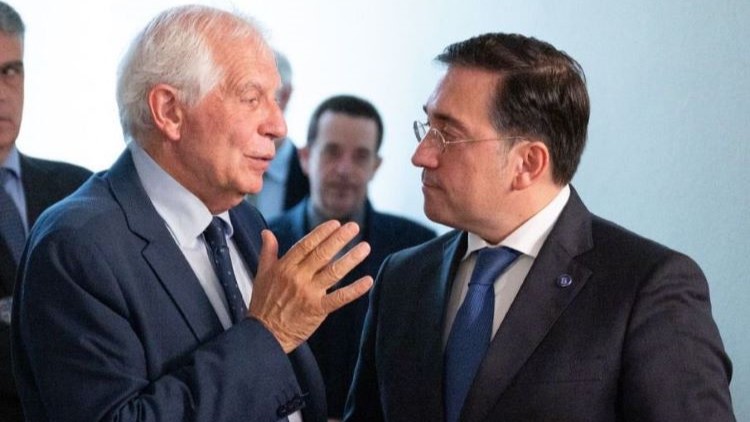Eduardo González
The High Representative for Foreign Policy of the European Union, Josep Borrell, yesterday expressed his wish that Spain “can host” the international peace conference for the Middle East endorsed last week by the European Council at the proposal of the acting Prime Minister, Pedro Sánchez.
“The conflict obliges us to commit ourselves politically to the two-state solution, that we make it real,” because, since the Oslo Accords in which this measure was approved, the European Union has spent thirty years “saying that this is the solution, but doing very little or nothing” to achieve it, Borrell declared during a conference at the headquarters of the Diplomatic School in Madrid.
Peace “will not come on its own, it has to be built and the international community has not done everything it should have done to implement the Oslo agreements,” Borrell continued. “If we do not stop the cycle of violence, it will be repeated in a few years,” he warned. For this reason, the high representative was in favor not only of holding the international peace conference proposed by the Spanish government “as soon as possible”, but even that Spain “could host it, as it hosted the Madrid conference” in 1991, which laid the theoretical foundations for the beginning of a peace process between Israelis and Palestinians.
On October 26, the leaders of the 27 agreed to “reactivate a political process based on the two-state solution” and showed “their support for the early holding of an international peace conference”, without further details. The conference had been proposed by Pedro Sanchez for “within six months” and with the objective that “the whole international community feels involved” in favor of the two-state solution. The Spanish proposal did not include any venue.
Support for António Guterres
In his speech, the High Representative reiterated that “Israel has the right to defend itself”, but that right has “a limit” and “some rules” that “are coined in international law and we have said so in reference to other conflicts”. “Cutting off water to a population is not compatible with the law of war,” he warned. “We call on Israel to respect international law,” because one should not “hold all Gazans responsible for the atrocities that Hamas commits and has committed,” said Borrell.
Borrell also expressed his support for UN Secretary General António Guterres in the face of the “strong reaction” generated in Israel by his words, in which he stated that Hamas attacks did not “come out of nowhere”, but were the result of decades of “suffocating occupation”. “I think he is right,” Borrell said. The Hamas attacks last October 7 “did not happen by magic,” but are “a response to a situation,” he continued. “To explain is not to justify,” warned the high representative, who recalled that the EU has condemned the attacks by the Islamist terrorist group in a “clear and forceful” manner.
On the other hand, Borrell warned that “double standards” should not be applied, because the Palestinian territories “are as occupied as are the Ukrainian territories invaded by Russia, in accordance with international law”. Besides, he added, the territory occupied by Israel “has increased fourfold” while the Palestinian territory “has been shrinking and dividing into unconnected areas”. “In what way does lamenting one tragedy detract from my moral strength to lament another?” asked Borrell. “I have the moral strength to condemn something if I condemn something else the same when it has been done elsewhere, by other people perhaps closer to me, and if we do not understand this we cannot be useful in trying to resolve the conflict,” he said. Therefore, he insisted, the EU “would lack moral authority” if it only denounced killings of civilians in Ukraine.
Albares
At the same event, the acting Minister of Foreign Affairs, José Manuel Albares, assured that Spain responds both in Ukraine and in Gaza “in the same way”, with the defense of the United Nations Charter and the treaties of the European Union and with “values that reject war as a way of resolving conflicts”.
He also warned that, at this time, it is necessary to focus on “the urgent” and prevent the current crisis from acquiring “a disproportionate dimension”, and reiterated that the “two-state solution” would be “the best guarantee of security for Israel and of stability, security and peace in the Middle East”.
The minister reaffirmed that Israel “suffered a terrorist attack and has the right to defend itself”, but warned that a distinction must be made “between terrorist and civilian targets” and that access to “basic supplies” must be provided to the population of Gaza. “Spain raised its voice the first to say that aid to Palestine has to continue, that we have to differentiate Hamas from the Palestinian people,” he insisted.







